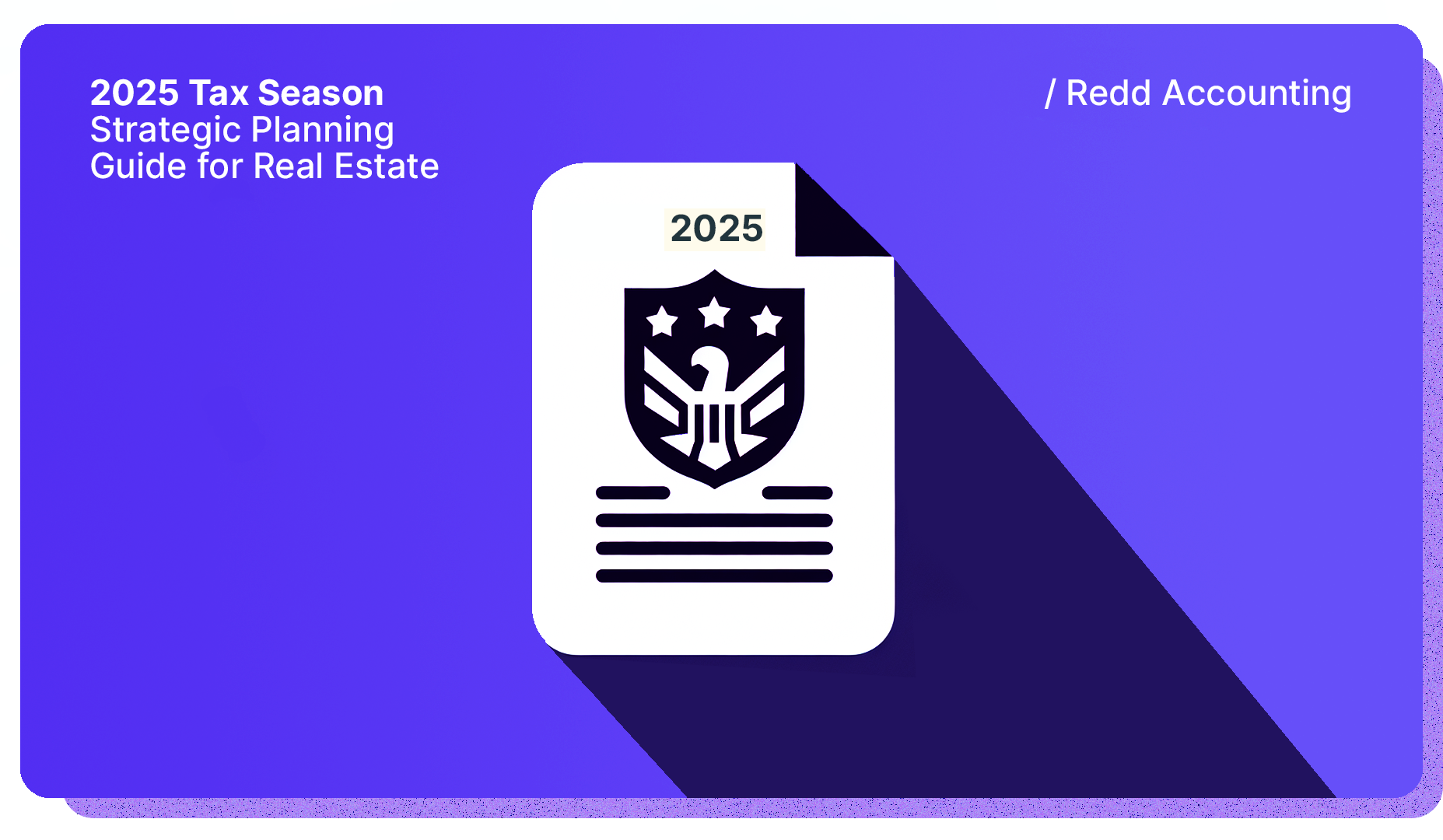2025 Tax Season: Strategic Planning Guide for
Real Estate Investors

The 2025 tax season brings unique challenges and opportunities for real estate investors with significant changes to depreciation rules, energy credits, and state-level regulations. We've analyzed the changes and we’re here to help with a quick guide that covers what you need to know.
Critical Changes for 2025
1. Bonus Depreciation Reduction: The bonus depreciation rate is decreasing from 80% in 2024 to 60% for properties placed in service during 2025. This makes the timing of property improvements and acquisitions more critical than ever (Instrumental Wealth).
2. Energy Efficiency Tax Credits: The Inflation Reduction Act enhanced the Energy Efficient Commercial Buildings Deduction (Section 179D). Commercial property owners can now claim up to $5.00 per square foot for qualified energy improvements that reduce energy usage by at least 25% (IRS).
3. State and Local Tax (SALT) Changes: Several states have introduced workarounds to the $10,000 SALT deduction cap by offering pass-through entity tax elections. These strategies can significantly impact your tax liability but vary widely by state (IRS and state-specific tax authorities).
1. Bonus Depreciation Reduction: The bonus depreciation rate is decreasing from 80% in 2024 to 60% for properties placed in service during 2025. This makes the timing of property improvements and acquisitions more critical than ever (Instrumental Wealth).
2. Energy Efficiency Tax Credits: The Inflation Reduction Act enhanced the Energy Efficient Commercial Buildings Deduction (Section 179D). Commercial property owners can now claim up to $5.00 per square foot for qualified energy improvements that reduce energy usage by at least 25% (IRS).
3. State and Local Tax (SALT) Changes: Several states have introduced workarounds to the $10,000 SALT deduction cap by offering pass-through entity tax elections. These strategies can significantly impact your tax liability but vary widely by state (IRS and state-specific tax authorities).
Strategic Opportunities to Consider Now
1. Cost Segregation Studies: With bonus depreciation still at 60%, cost segregation studies remain a powerful tax planning tool. For example, investors can save $100,000+ in current-year taxes on properties valued at $1 million or more through accelerated depreciation.
2. Energy Credit Stacking: Recent IRS guidance allows investors to combine multiple energy credits. For instance, it is now possible to stack the 179D deduction with local energy incentives, potentially doubling tax benefits for energy efficiency projects (IRS Guidance).
3. Pass-Through Entity Elections: More states are offering pass-through entity tax elections, enabling businesses to deduct state taxes above the $10,000 SALT cap at the entity level. Review your state's specific regulations to determine if this strategy applies to you.
1. Cost Segregation Studies: With bonus depreciation still at 60%, cost segregation studies remain a powerful tax planning tool. For example, investors can save $100,000+ in current-year taxes on properties valued at $1 million or more through accelerated depreciation.
2. Energy Credit Stacking: Recent IRS guidance allows investors to combine multiple energy credits. For instance, it is now possible to stack the 179D deduction with local energy incentives, potentially doubling tax benefits for energy efficiency projects (IRS Guidance).
3. Pass-Through Entity Elections: More states are offering pass-through entity tax elections, enabling businesses to deduct state taxes above the $10,000 SALT cap at the entity level. Review your state's specific regulations to determine if this strategy applies to you.
Common Pitfalls to Avoid
1. Misclassifying Improvements: The IRS has increased scrutiny on the distinction between repairs (immediately deductible) and improvements (capitalized and depreciated). Misclassifying these expenses can lead to audits and penalties (IRS Publication 946).
2. Missing Passive Activity Elections: Real estate professionals often miss the opportunity to aggregate properties for the passive activity loss rules. Making this election can enable losses to be deductible instead of suspended (IRS Form 8582 Instructions).
3. Overlooking State Compliance: States with economic nexus rules are increasing penalties for non-compliance. Investors with out-of-state properties must remain vigilant about meeting all filing requirements to avoid unexpected liabilities (Multistate Tax Commission).
1. Misclassifying Improvements: The IRS has increased scrutiny on the distinction between repairs (immediately deductible) and improvements (capitalized and depreciated). Misclassifying these expenses can lead to audits and penalties (IRS Publication 946).
2. Missing Passive Activity Elections: Real estate professionals often miss the opportunity to aggregate properties for the passive activity loss rules. Making this election can enable losses to be deductible instead of suspended (IRS Form 8582 Instructions).
3. Overlooking State Compliance: States with economic nexus rules are increasing penalties for non-compliance. Investors with out-of-state properties must remain vigilant about meeting all filing requirements to avoid unexpected liabilities (Multistate Tax Commission).
Action Items for Q1 2025
1. Schedule a cost segregation feasibility analysis for properties acquired in 2024
2. Review and document all property improvements to support repair vs. capitalization decisions
3. Evaluate state tax elections before filing deadlines
4. Document energy improvements completed in 2024 to maximize available credits
Note: This analysis is for informational purposes only and does not constitute tax advice. For guidance specific to your situation, please consult with a qualified tax advisor.
REDD Accounting is a global firm specializing in property accounting and bookkeeping services for real estate companies. Whether you are a small-scale operation or managing a large portfolio of properties, we have the expertise and resources to support your unique needs.
Ready to optimize your tax strategy?
/ Redd
© Redd Accounting 2025